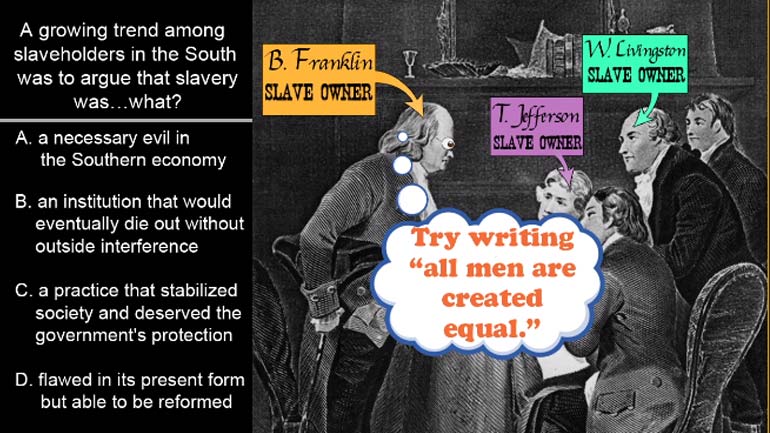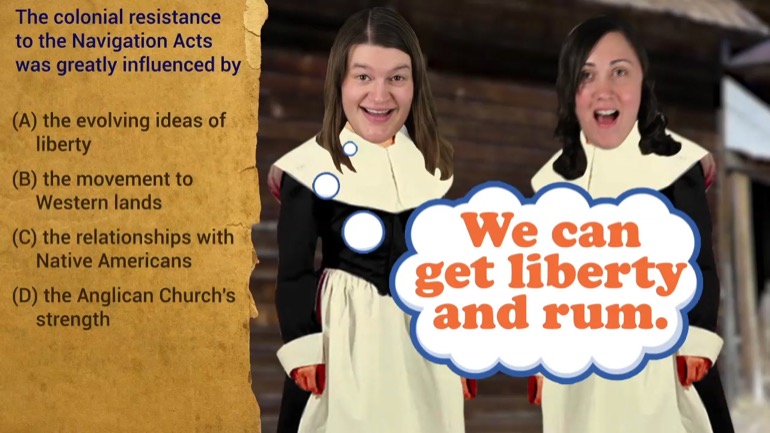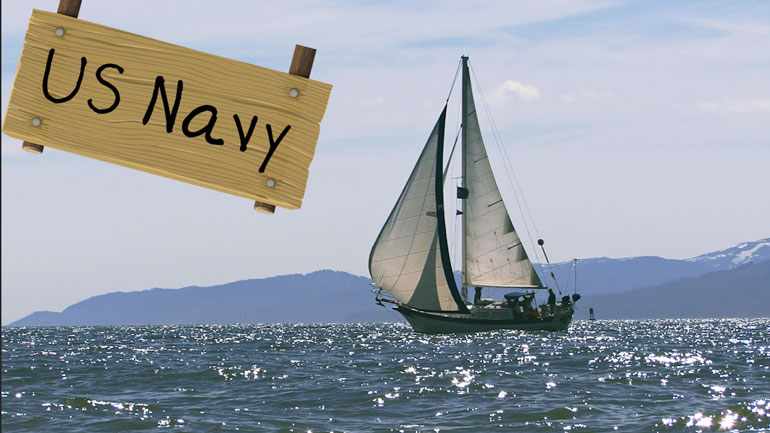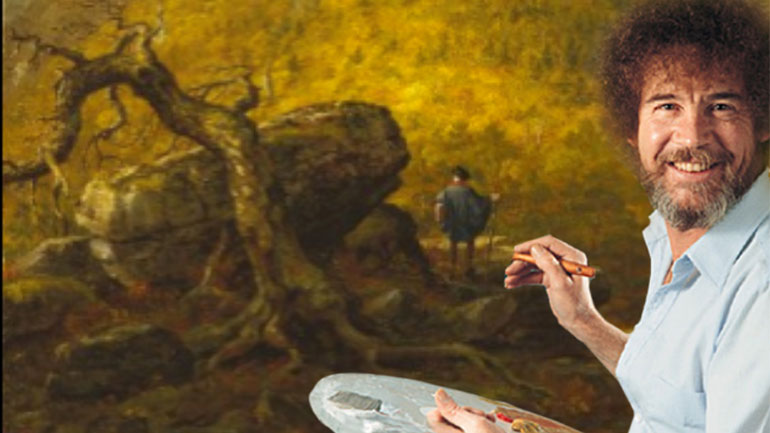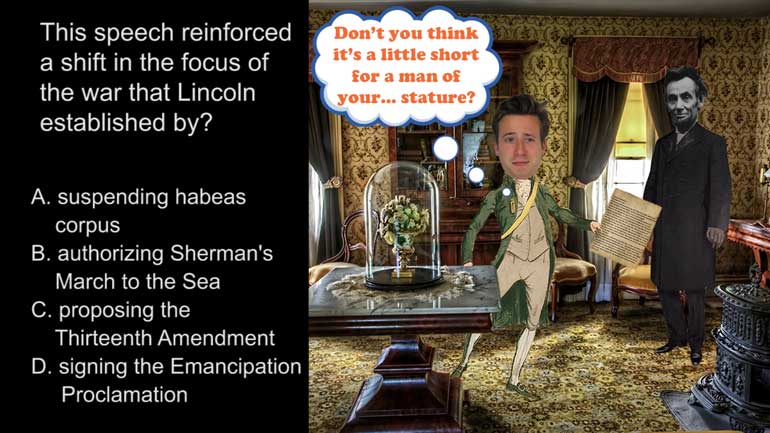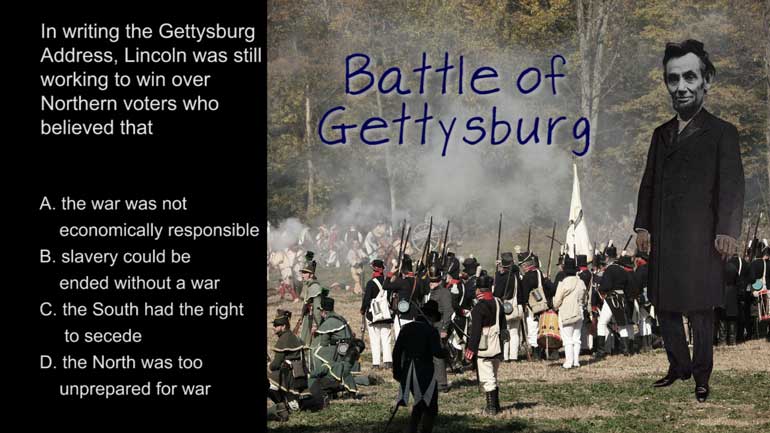ShmoopTube
Where Monty Python meets your 10th grade teacher.
Search Thousands of Shmoop Videos
Playlist U.S. History: 1800 – 1848 11 videos
AP U.S. History 1.2 Period 4: 1800-1848. A growing trend among slaveholders in the South was to argue that slavery was...what?
AP US History: Politics in Antebellum America Drill 1, Problem 1. Expanding government and regulation into the Louisiana territory proved chal...
AP U.S. History 1.1 Period 4: 1800-1848 335 Views
Share It!
Description:
AP U.S. History 1.1 Period 4: 1800-1848. The "separation" that the American Colonization Society advocates for is...what?
Transcript
- 00:00
[ musical flourish ]
- 00:03
And here's your Shmoop du jour, brought to you by separation anxiety,
- 00:07
every pea pod's greatest fear.
- 00:11
All right, take a look at this excerpt.
- 00:13
All right. No argument is necessary... [ mumbles ]
Full Transcript
- 00:17
All right, and the question:
- 00:18
The separation that the American Colonization Society
- 00:22
advocates for is... what?
- 00:24
And here are your potential answers.
- 00:26
[ mumbles ]
- 00:29
All right. Well, what exactly is the separation...
- 00:33
mentioned in the question? Hmm?
- 00:35
Well, if you look at the last of the excerpt - right here -
- 00:38
it says that "those who are now free
- 00:41
should be provided with the means of attaining... happiness,
- 00:45
which... they can never be likely to reach in this country."
- 00:49
Hmm.
- 00:50
So the American Colonization Society
- 00:52
was basically saying
- 00:54
that, should slaves be freed,
- 00:56
people had a responsibility to help them adjust to their new life.
- 01:01
Well, let's see which answer points to what exactly their plan was.
- 01:05
So was the separation referring to A -
- 01:08
freeing all slaves from the bonds of servitude?
- 01:11
Well, it definitely seems like the American Colonization Society
- 01:13
is advocating for the end of slavery.
- 01:17
But by saying that slaves can never be likely
- 01:19
to achieve happiness in this country, it seems like
- 01:21
racial discrimination was influencing their thinking.
- 01:24
[ oh, snap! ]
- 01:26
So, it probably isn't A.
- 01:28
And, in fact, that kind of discriminatory thought would also
- 01:31
B - establish sanctuaries
- 01:33
in the North for escaped slaves.
- 01:37
So let's keep looking.
- 01:38
Did the separation refer to C -
- 01:41
giving slaves reparations
- 01:43
including arable land?
- 01:44
Well, remember that piece of the excerpt,
- 01:47
"can never be likely to achieve happiness in this country"?
- 01:50
Well, it seems like the American Colonization Society
- 01:53
wouldn't want to grant land to freed slaves in America.
- 01:56
So that knocks out C, as well.
- 02:00
Which must mean that it referred to D -
- 02:03
repatriating slaves back to Africa.
- 02:07
Unfortunately, one of the major problems with slavery was
- 02:09
what would happen to the nearly four million African Americans
- 02:12
if they were freed.
- 02:14
Because slaves were largely illiterate,
- 02:16
some abolitionists were concerned with what
- 02:18
kinds of jobs and opportunities would be available
- 02:20
to a large population suddenly flooding the work force.
- 02:23
One of those abolitionist groups,
- 02:25
the American Colonization Society,
- 02:27
advocated a return to Africa,
- 02:29
so they recruited and funded Black colonists
- 02:32
to colonize Liberia.
- 02:37
Yeah. So the correct answer is D.
- 02:39
And actually, Liberia's capital,
- 02:41
Monrovia, is named after our fifth president, James Monroe,
- 02:45
who was in office when the country was founded.
- 02:47
Good thing it wasn't our sixth president.
- 02:49
QuincyAdamsovia is a bit of a mouthful.
- 02:52
[ cow moos ]
Related Videos
AP U.S. History Exam 2.45. The journey shown on the map was an example of...what?
AP U.S. History Exam 2.26. This speech reinforced a shift in the focus of the war that Lincoln established by...what?
What did the Spanish messengers bring with them to North America? Hint: you probably wouldn't be thrilled to get this for your next birthday.
AP U.S. History Diagnostic 24. How did the United States choose containment over the National Security Council Report in Latin America?
AP U.S. History Exam 2.25. In writing the Gettysburg Address, Lincoln was still working to win over Northern voters who believed that...what?

